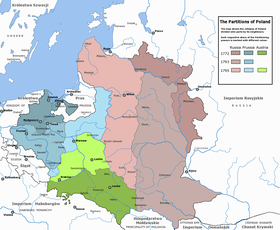
Back Teilungen Polens ALS تقاسم بولندا Arabic Particiones de Polonia AST Reç Pospolitanın bölüşdürülməsi Azerbaijani Падзелы Рэчы Паспалітай Byelorussian Падзелы Рэчы Паспалітай BE-X-OLD Поделби на Полша Bulgarian Repartiment de Polònia Catalan Dělení Polska Czech Polens tre delinger Danish
| Partitions of Poland | |
|---|---|
 The Polish–Lithuanian Commonwealth in 1772 | |
| Partitions | |
 The three partitions of Polish-Lithuanian Commonwealth: the Russian Partition (brown), the Austrian Partition (green), and the Prussian Partition (blue) |
The Partitions of Poland[a] were three partitions of the Polish–Lithuanian Commonwealth that took place toward the end of the 18th century and ended the existence of the state, resulting in the elimination of sovereign Poland and Lithuania for 123 years. The partitions were conducted by the Habsburg monarchy, the Kingdom of Prussia, and the Russian Empire, which divided up the Commonwealth lands among themselves progressively in the process of territorial seizures and annexations.[1][2][3][4]
The First Partition was decided on August 5, 1772, after the Bar Confederation lost the war with Russia. The Second Partition occurred in the aftermath of the Polish–Russian War of 1792 and the Targowica Confederation when Russian and Prussian troops entered the Commonwealth and the partition treaty was signed during the Grodno Sejm on January 23, 1793 (without Austria). The Third Partition took place on October 24, 1795, in reaction to the unsuccessful Polish Kościuszko Uprising the previous year. With this partition, the Commonwealth ceased to exist.[1]
In English, the term "Partitions of Poland" is sometimes used geographically as toponymy, to mean the three parts that the partitioning powers divided the Commonwealth into, namely: the Austrian Partition, the Prussian Partition and the Russian Partition. In Polish, there are two separate words for the two meanings. The consecutive acts of dividing and annexation of Poland are referred to as rozbiór (plural: rozbiory), while the term zabór (plural: zabory) refers to parts of the Commonwealth that were annexed in 1772–1795 and which became part of Imperial Russia, Prussia, or Austria. Following the Congress of Vienna in 1815, the borders of the three partitioned sectors were redrawn; the Austrians established Galicia in the Austrian partition, whereas the Russians gained Warsaw from Prussia and formed an autonomous polity known as Congress Poland in the Russian partition.
In Polish historiography, the term "Fourth Partition of Poland" has also been used, in reference to any subsequent annexation of Polish lands by foreign invaders. Depending on source and historical period, this could mean the events of 1815, or 1832 and 1846, or 1939. The term "Fourth Partition" in a temporal sense can also mean the diaspora communities that played an important political role in re-establishing the Polish sovereign state after 1918.
Cite error: There are <ref group=lower-alpha> tags or {{efn}} templates on this page, but the references will not show without a {{reflist|group=lower-alpha}} template or {{notelist}} template (see the help page).
- ^ a b Cite error: The named reference
Britwas invoked but never defined (see the help page). - ^ Bideleux, Robert; Jeffries, Ian (1998). A History of Eastern Europe: Crisis and Change. Routledge. p. 156.
- ^ Batt, Judy; Wolczuk, Kataryna (2002). Region, State and Identity in Central and Eastern Europe. Routledge. p. 153.
- ^ Sinkoff, Nancy (2004). Out of the Shtetl: Making Jews Modern in the Polish Borderlands. Society of Biblical Literature. p. 271.